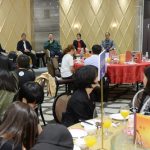 The Chief Executive, Mr Chui Sai On, chats with Macao’s young people studying in Jinan University to gain a better understanding on their situation for learning and living there.
The Chief Executive, Mr Chui Sai On, chats with Macao’s young people studying in Jinan University to gain a better understanding on their situation for learning and living there.
The Chief Executive, Mr Chui Sai On, encouraged Macao’s young people to diversify their efforts at personal development, including via study, and by gaining practical experience and learning teamwork via involvement in the work of local associations. Mr Chui made the remarks on Friday (18 November) in Guangzhou, Guangdong Province, when he took part in an exchange session with some 150 Macao young people that are studying at Jinan University. During the session, Mr Chui shared his own experience: he explained that when he first graduated from university, he did not really know what ‘dream’ to pursue; he was looking for a stable job. He noted that a person’s career plans can change after gaining experience of the world of work. The Government is striving to tackle challenges, in order to maintain Macao’s long-term prosperity and the well-being of its people. The Government needs to pay close attention to young people’s opinions, as they are the future of the community and an important asset of the city, Mr Chui added. Sharing his insights on effective management, Mr Chui said the development of good interpersonal relationships was an important tool to help solve problems: unofficial communication on a topic might be more effective for tackling issues than official meetings. The Chief Executive also shared his opinion on employment opportunities in Macao; industrial development; scholarship schemes; academic research; and development of business and of new media. Regarding employment opportunities in Macao, Mr Chui said statistics indicated there was a high rate of employment among Macao’s young people – whether they had studied in Macao or outside the city. He said the experience young people gained in their first few jobs was important, as they could gather knowledge not available via the classroom. The Government was pleased to be able to offer more support to sectors that were nascent in Macao, such as: the cultural and creative industries; traditional Chinese medicine; high-end services; specialised financial services; and the MICE (meetings, incentives, conferences and exhibitions) sector. Great potential was envisaged for those industries and their development was seen as a step toward diversifying the city’s economy. Mr Chui noted there might be a great number of development opportunities arising from the cultural and creative industries. He nonetheless urged young people to pay extra attention to the potential risks in those career paths. Regarding the development of new media, Mr Chui said he considered it an inevitable trend: the Government understood the importance of new media in relation to disseminating information. The Government would use further policies in order progressively to advance the development of new media in Macao. The Chief-of-Office of the Chief Executive’s Office, Ms O Lam; Vice Chairman of the Board of Directors of Jinan University – and President of the Jinan University Macao Alumni Association – Mr Ma Iao Hang; Vice President of Jinan University, Mr Xia Quan; and the Director of the Jinan University Macao Alumni Association, Mr Lai Pak Keong; along with teachers from Jinan University; and 30 alumni, also attended Friday evening’s session. Mr Chui was in Guangzhou on Friday and Saturday for a two-day visit, following an invitation from Jinan University to participate in the celebrations of the 110th anniversary of the institution’s establishment.


